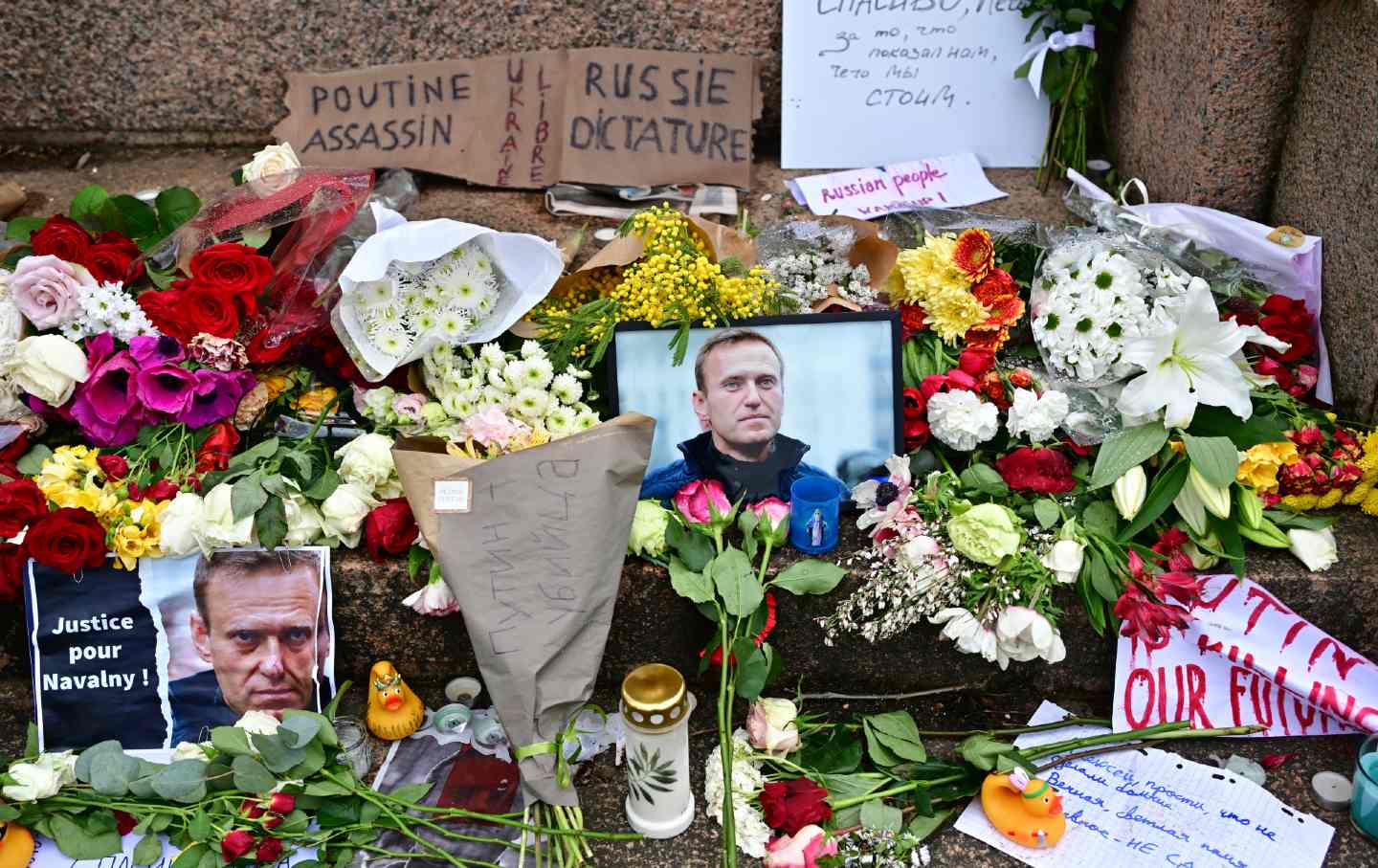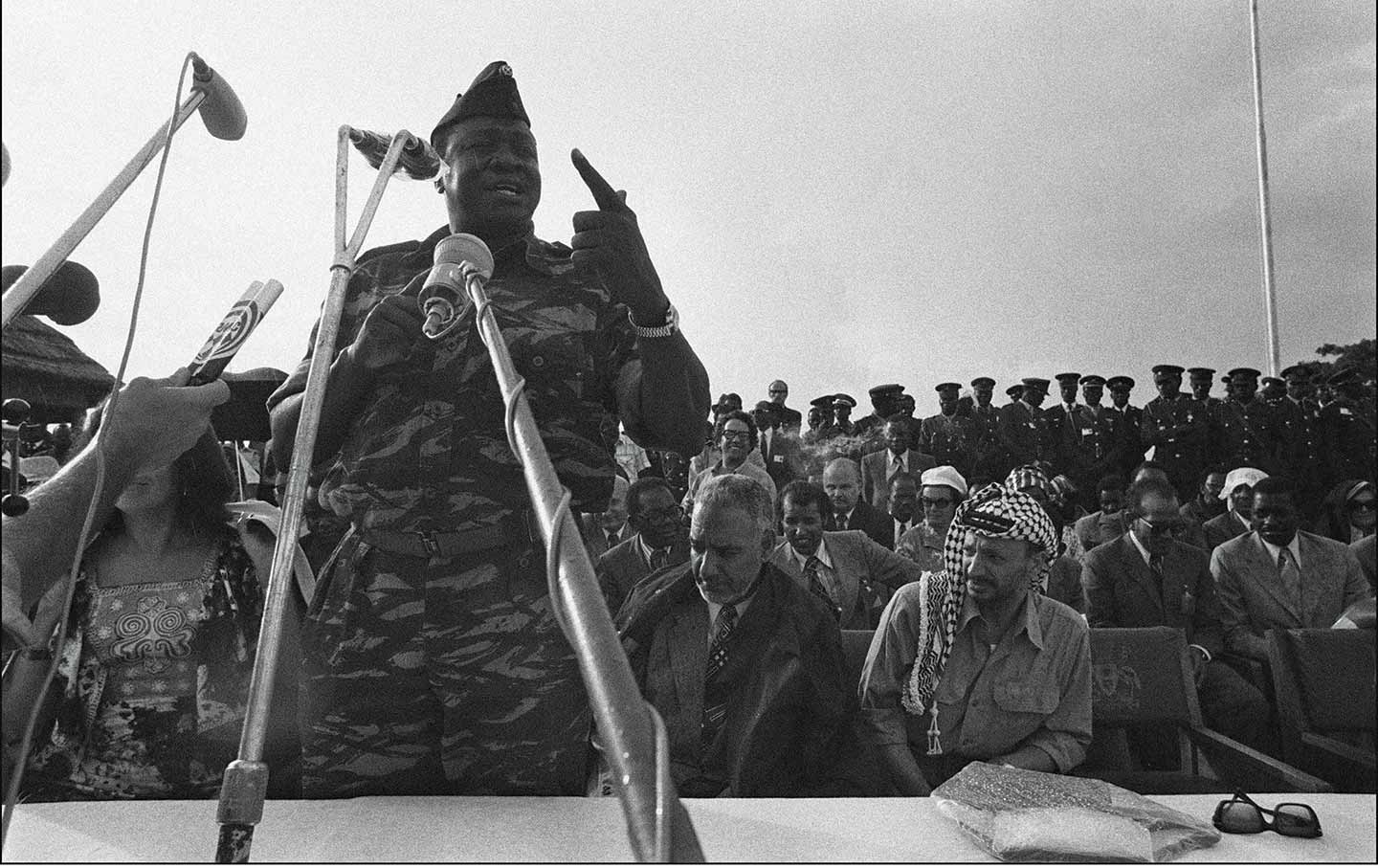Russian Opposition Leader Navalny Was Brave, Authentic, Funny, Larger Than Life. Will His Movement Survive Him?
More than a politician, he became a talisman for Russia’s liberals.

Each day, hundreds of people brave police to leave flowers and notes at makeshift memorials to Russian opposition leader Alexey Navalny, whose death was announced on Friday. Several were arrested simply for laying bouquets, according to OVD Info, an independent group that monitors political persecutions. (Over 350 people have so far been detained at vigils across 39 cities.)
In Moscow, mourners lay flowers at the Wall of Grief, a monument to victims of Stalinism and the site of many of Navalny’s boisterous rallies. It is located on a street named after Andrey Sakharov. The Soviet Union’s most famous dissident spent years under house arrest before dying of a heart attack in 1989, shortly after his release by reformist president Mikhail Gorbachev.
Though they are separated by decades and railed against two very different regimes, Sakharov and Navalny had much in common. Both possessed extraordinary charisma, courage, doggedness, and moral purpose. And despite being feted in the West in quasi-messianic terms, neither quite managed to articulate a coherent political program or reach a mass domestic audience outside the tight-knit circles of the Soviet intelligentsia or the urban middle classes, respectively.
In the end, Sakharov’s inspiring but vague vision of a democracy built on pluralism and human rights could not survive contact with the mobster capitalism of the 1990s. Navalny’s dream of a “beautiful Russia of the future” based on individual liberty and rule of law crumbled in the face of violent irredentism abroad and heightened repression at home.
From Washington to Moscow, Navalny’s death was immediately exploited by the usual suspects for their own ends. Russophobes like Anne Applebaum took the opportunity to blame both Russia’s leadership and its people, as well as taking a veiled swipe at Trump supporters: “Putin killed him—because of his political success, because of his ability to reach people with the truth, and because of his talent for breaking through the fog of propaganda that now blinds his countrymen, and some of ours as well,” Applebaum wrote in The Atlantic.
Bill Browder, a former Kremlin cheerleader turned anti-Putin crusader, used the tragedy to boast about his own prescience: “Three years ago I said President Putin was carrying out a slow motion assassination of Russia’s leading dissident Alexei Navalny,” he wrote in the Daily Mail on February 16. “Today, my worst fears were realised.”
Surrealistically, Mikhail Ulyanov, Russia’s ambassador to international organizations in Vienna, seemed to suggest a Western conspiracy. “Ask yourself a very simple question,” he wrote on X (formerly Twitter), “why a person with 0.2% of support in Russia could die just before the serious elections [sic]. If his death was not natural, it could have been interesting only for current opponents of Russia.”
Navalny was brave, authentic, funny, larger than life. More than a politician, he had become a kind of talisman for Russia’s liberals, writes Jeremy Morris of Denmark’s Aarhus University. However, “without a movement that can connect different kinds of people and show them that they have common material interests, clever slogans, social media, and urban youth organizing isn’t enough.”
Moreover, Navalny’s oft-quoted desire to see Russia become a “normal country” was sounding increasingly anachronistic in a world where even among liberal democracies “normal” now includes ceaseless wars, rampant inequality, corporate impunity, ecological devastation, runaway surveillance, and weaponized xenophobia.
The uncomfortable truth is that, by the time of his death, Navalny had already outlived the movement he founded. Until last Friday his very survival, however precarious, served as the last crutch for an opposition that has been in disarray since 2021. That was the year of Navalny’s ill-fated return to Russia from Germany, where he was convalescing after a near-fatal poisoning attempt in Siberia involving the Novichok nerve agent.
The Russian government swiftly jailed Navalny and designated his Anti-Corruption Foundation an extremist organization. Facing arrest, most of its leaders and key supporters fled to Eastern Europe and beyond. With the opposition leader behind bars and his staff in exile, it became increasingly difficult to organize, raise funds, and remain relevant.
The following year, the invasion of Ukraine drew attention away from domestic corruption—Navalny’s central preoccupation—with a brutal crackdown on all criticism of the government. Abroad, his ambiguous position on Ukraine—Navalny appeared to justify the 2014 annexation of the Crimea before eventually speaking out against the current war—dampened support from many Western liberals already in thrall to a new hero, Volodymir Zelensky.
Isolated and all but silenced, Navalny’s power waned with each year spent in prison. By the start of 2023, his approval rating had halved to 9 percent from 19 percent in 2021, according to the Levada Centre, Russia’s last remaining independent polling organization—itself designated a foreign agent. Incredibly, more than half of respondents considered his sentencing to have been fair and agreed that he should be punished.
Given such grim polls, “the regime’s expectation that memories of Navalny will fade is partly justified,” writes the political observer Andrei Kolesnikov. “The silent part of society, which prefers to applaud any initiative by the autocracy over free speech, will withdraw into itself even further, or even start to demonstrate zeal in its support for the authorities. Some passive conformists will understand that for personal peace of mind, they need to turn into active conformists.”
Popular
“swipe left below to view more authors”Swipe →Should they come to pass, Kolesnikov’s predictions bode ill for the swelling ranks of political prisoners of all ideological stripes who languish in Russian jails and risk sharing Navalny’s fate. They include the liberal activist Vladimir Kara-Murza, who recently recovered from an apparent poisoning attempt (“treason”); opposition politician Ilya Yashin (spreading “fake information” about the Russian armed forces); left-wing sociologist Boris Kagarlitsky (“terrorism”); and even the right-wing militant Igor Girkin, aka Strelkov, a notorious former commander of the pro-Russian separatists in Donetsk who later called Putin a coward for not being aggressive enough in Ukraine (“extremism”). The far-left firebrand Sergey Udaltsov remains in pretrial detention, having been placed on the terrorist registry, his assets frozen.
Set amid this backdrop of repression, Navalny’s death leaves an even greater political and spiritual void. Yet Russia’s dark history of authoritarian rulers eliminating their most gifted opponents may also offer a glimmer of hope.
Take the brilliant revolutionary known as much for his charismatic leadership as for his “infectious gaiety” and “ameliorating charm,” in the words of his biographer, the late professor Stephen Cohen. Though these words could easily refer to Navalny, they describe Nikolay Bukharin, the Bolshevik polymath who opposed the dictatorship being built by Stalin in the 1930s only to be executed as an enemy of the people in 1937. It took half a century for him to be rehabilitated. Still, his indominable widow, Anna Larina, who spent years in the gulag and decades pushing to clear his name, lived to see Bukharin’s advocacy for decentralized executive power and a mixed economy eventually form the cornerstone of Gorbachev’s perestroika. It’s not impossible that at least some of the younger people placing carnations on the Wall of Grief today may one day see a version of Navalny’s dream brought to life by a future reformer. Yet, for now, the prevailing mood among his supporters remains one of despair, not hope or even anger and vengeance. As Violetta Grudina, the exiled former head of Navanly’s organization in the Arctic city of Murmansk, wrote to her Telegram followers: “I don’t know how to console you, my dears. I try to distract myself, but every mention of Alexey in the news triggers a new wave of uncontrollable tears. It hurts a lot.”
Disobey authoritarians, support The Nation
Over the past year you’ve read Nation writers like Elie Mystal, Kaveh Akbar, John Nichols, Joan Walsh, Bryce Covert, Dave Zirin, Jeet Heer, Michael T. Klare, Katha Pollitt, Amy Littlefield, Gregg Gonsalves, and Sasha Abramsky take on the Trump family’s corruption, set the record straight about Robert F. Kennedy Jr.’s catastrophic Make America Healthy Again movement, survey the fallout and human cost of the DOGE wrecking ball, anticipate the Supreme Court’s dangerous antidemocratic rulings, and amplify successful tactics of resistance on the streets and in Congress.
We publish these stories because when members of our communities are being abducted, household debt is climbing, and AI data centers are causing water and electricity shortages, we have a duty as journalists to do all we can to inform the public.
In 2026, our aim is to do more than ever before—but we need your support to make that happen.
Through December 31, a generous donor will match all donations up to $75,000. That means that your contribution will be doubled, dollar for dollar. If we hit the full match, we’ll be starting 2026 with $150,000 to invest in the stories that impact real people’s lives—the kinds of stories that billionaire-owned, corporate-backed outlets aren’t covering.
With your support, our team will publish major stories that the president and his allies won’t want you to read. We’ll cover the emerging military-tech industrial complex and matters of war, peace, and surveillance, as well as the affordability crisis, hunger, housing, healthcare, the environment, attacks on reproductive rights, and much more. At the same time, we’ll imagine alternatives to Trumpian rule and uplift efforts to create a better world, here and now.
While your gift has twice the impact, I’m asking you to support The Nation with a donation today. You’ll empower the journalists, editors, and fact-checkers best equipped to hold this authoritarian administration to account.
I hope you won’t miss this moment—donate to The Nation today.
Onward,
Katrina vanden Heuvel
Editor and publisher, The Nation
More from The Nation

Mahmood Mamdani’s Uganda Mahmood Mamdani’s Uganda
In his new book Slow Poison, the accomplished anthropologist revisits the Idi Amin and Yoweri Museveni years.

The US Is Looking More Like Putin’s Russia Every Day The US Is Looking More Like Putin’s Russia Every Day
We may already be on a superhighway to the sort of class- and race-stratified autocracy that it took Russia so many years to become after the Soviet Union collapsed.

Israel Wants to Destroy My Family's Way of Life. We'll Never Give In. Israel Wants to Destroy My Family's Way of Life. We'll Never Give In.
My family's olive trees have stood in Gaza for decades. Despite genocide, drought, pollution, toxic mines, uprooting, bulldozing, and burning, they're still here—and so are we.

Trump’s National Security Strategy and the Big Con Trump’s National Security Strategy and the Big Con
Sense, nonsense, and lunacy.

Does Russian Feminism Have a Future? Does Russian Feminism Have a Future?
A Russian feminist reflects on Julia Ioffe’s history of modern Russia.

Ukraine’s War on Its Unions Ukraine’s War on Its Unions
Since the start of the war, the Ukrainian government has been cracking down harder on unions and workers’ rights. But slowly, the public mood is shifting.


